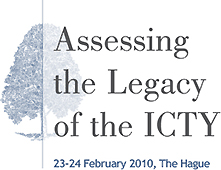
A Conference of the International Criminal Tribunal for the former Yugoslavia
Co-organised and co-sponsored by
the Government of the Netherlands and
the Sanela Diana Jenkins Human Rights Project at UCLA School of Law
Summary
The International Criminal Tribunal for the former Yugoslavia (ICTY) convened a two-day Conference “Assessing the Legacy of the ICTY” in The Hague on 23-24 February 2010. The Conference was co-organised and co-sponsored by the Government of the Netherlands and the Sanela Diana Jenkins Human Rights Project at UCLA School of Law.
Inspired by broader UN efforts to coordinate rule of law activities, and by interest from governments, policy-makers, scholars and others, the Conference provided a platform for the Tribunal and relevant stakeholders to share their respective views of the Tribunal’s legacy and their respective visions of how best to utilise its legal and institutional legacies, as well as how to exchange information about the legacy work that is being carried out by the Tribunal, other UN and international organisations, national governments and courts, non-governmental organisations and scholars.
A primary objective of the Conference was to promote coordination and cooperation among various actors in order to strengthen efforts in utilising the Tribunal’s legacy for the purposes of the rule of law and peace and justice in the former Yugoslavia and beyond.
ICTY’s Legacy
The Tribunal’s legacy, conceptualised broadly as “that which the Tribunal will hand down to successors and others,” includes but is not limited to the findings of the Tribunal contained in its judgements, its contribution to the development of international law, the records and archives of the Tribunal, its contribution to the rule of law in the former Yugoslavia and its advancement of international justice.
There is a range of views on the breadth, depth and content of the Tribunal’s legacy and most would agree that the process of establishing that legacy is not yet completed. Governments, nongovernmental organisations, foundations, scholars and others may facilitate the strengthening of the Tribunal’s legacy in many ways: politically, financially, and organisationally, as well as through information, documentation, communication and analysis.
The Tribunal’s strategy for establishing and ensuring utilisation of its legacy by the countries of the former Yugoslavia has been actively pursued over the last few years and has comprised two major elements: first, assisting in building the capacity of domestic judicial systems to take full responsibility for war crimes prosecutions after the Tribunal closes; and second, ensuring that courts and other interested parties in the region have access to relevant materials from the Tribunal in a useable form. Other elements of the Tribunal’s comprehensive legacy strategy are yet to be developed. The Conference provided provide fertile ground for assessing the ICTY’s legacy, for sharing ideas and expectations about it and for developing new approaches and arrangements to strengthen the legacy of the Tribunal.
Goals of the Conference
- To stimulate discussion among a wide range of stakeholders on the elements of the Tribunal’s legacy and its utilisation in the former Yugoslavia as well as globally
- To share and gather views with the countries of the former Yugoslavia, the international community and the Host Country regarding the Tribunal’s overall legacy
- To share and gather information about current projects and activities related to the ICTY’s legacy being carried out by the Tribunal and other organisations
- To discuss the role of the Security Council and other organs of the United Nations in preserving the Tribunal’s legacy
- To consult stakeholders in order to enhance further the ICTY’s legacy and its utilisation in the former Yugoslavia
- To promote the strengthening and consolidating of efforts to build the capacity of the domestic jurisdictions in the former Yugoslavia
- To facilitate the development of the Tribunal’s comprehensive legacy strategy
Participants
The participants and invitees of the Conference included the Tribunal’s Principals, Judges, senior Tribunal staff, the Host Country, the Security Council Working Group on the ad hoc Tribunals, the Office of Legal Counsel and Rule of Law Unit from UNHQ, representatives of the national jurisdictions in the former Yugoslavia, victim groups, non-governmental organisations and other stakeholders in the former Yugoslavia, international organisations, organs of the European Union, legal counsel of embassies based in The Hague, think tanks, policy makers and international law scholars.
Conference Format
Approximately 400 persons participated in the Conference. The working sessions were organised in panel discussion format to encourage open dialogue, with opportunities for the audience to put questions to the panellists and engage in the discussion.
The panel discussions had the following topics:
- Panel 1: ICTY’s Legacy Strategy and Legacy Projects
- Panel 2: Preserving ICTY’s Legacy in the Long Term: the Future Residual Mechanism(s), ICTY’s Archives and Information Centres
- Panel 3: Importance of ICTY’s Legacy for the Victims and Communities in the Former Yugoslavia
- Panel 4: Capacity Building
- Panel 5: National War Crimes Proceedings
- Panel 6: Way Forward

